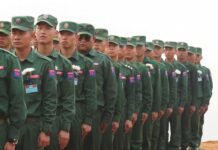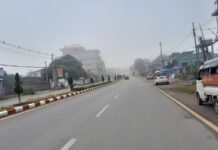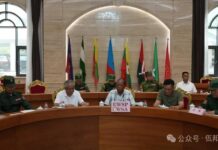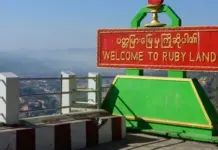As the Panghsang meeting, held from 1 to 6 May and attended by 65 ethnic leaders, was still in progress, President Thein Sein, in his monthly radio message, said that the government is ready to sign the Nationwide Ceasefire Agreement (NCA) draft, as soon as the Ethnic Armed Organizations’ (EAOs) leaders endorsed it.

On 4 May, Thein Sein in his speech said: “A milestone was reached in the peace process when the Union Peace Work Committee (UPWC) and the Nationwide Ceasefire Coordination Team (NCCT) signed a draft nationwide ceasefire agreement, an event that I attended. The NCCT will now submit the draft agreement for consideration by the ethnic leaders at the next ethnic summit. My government is ready to finalize the nationwide ceasefire agreement, and is waiting for the outcome from the ethnic summit.”
Furthermore, he said: “As examples in other countries show, it is difficult to achieve peace within a single term of an elected government. My government’s objective is to leave a foundation for the next government to build on— one where there is no more fighting and political dialogue has started. All parties have accepted that the only way to resolve armed conflict is through a political solution.”
To complicate the President’s overtures, the Tatmadaw (Burma Army) issued an ultimatum that any news outlet disseminating the Kokang or Myanmar National Defence Alliance Army (MNDAA) statements will be faced with a lawsuit and dealt with accordingly. Thus creating an uneasy row between the media and the military, the latter of which is keen to impose its will and censorship in relation to issues that it considers should be classified or those it dislikes publicized in any way.
Parallel to this, the three Ethnic Armed Organizations (EAOs), the MNDAA, Ta’ang National Liberation Front (TNLF) and Arakan Army (AA), voiced their displeasure at the meeting, threatening to resign from the NCCT and also rejecting the 5th NCA draft, for the regime’s refusal to recognize them as legitimate, negotiation partners. Besides, they were also at odds with the lack of the NCCT’s solidarity as a collective group and at its decision as negotiators to sign the draft document, at a time, when they were reeling under the Tatmadaw’s military onslaught.
To add more confusion to the existing situation, on the heels of the Panghsang meeting, the UPWC, the two EAOs – Karen National Union (KNU) and Restoration Council of Shan State (RCSS) – and registered political parties will meet, on 9 May, in Yangon, according to a Myanmar Times report of 7 May. This is either to push for speedy signing of NCA and convening political dialogue or revitalizing the Deed of Commitment Statement authorized and promoted by the President himself, on 12 February, Union Day.
The “Deed of Commitment for Peace and National Reconciliation” is a kind of memorandum of understanding, pledging to achieve peace and reconciliation through political dialogue.
This is seen as a deliberate attempt to woo the EAOs to sign the 5th NCA draft without amendment by the UPWC and failing that, it would fall back on the President’s Deed of Commitment Statement, which neither has legal boundary nor an enforceable mechanism. Nevertheless, it would send a message to international donors that the government is still on the ball, which would probably convince them not to turn off the financial tap. Of course, if this is going to work to the advantage of the “peace industrial complex”, partly employed by the government’s henchmen is anybody’s guess.
According to Wikipedia, the peace-industrial complex defines the industry and economy derived from development, peacemaking, peace-building, and conflict resolution at both the domestic and foreign levels.
Although the Panghsang meeting of selected EAOs’ leaders doesn’t explicitly include all NCCT members, the outcome of the meeting would certainly have a big impact on the scrutinizing of the NCA draft at the forthcoming all NCCT member meeting, presumably to be held in KNU controlled area of Lawkhila, after the 9 May, Yangon meeting. In other words, the faith of whether the draft should be endorsed without altering or ought to be amended with additional clauses, will be decided at this meeting.
It now seems the President’s wish will not be easily and speedily fulfilled, for all the EAOs’ leaders attending the Panghsang meeting have overwhelmingly decided to amend the draft with additional clauses before ratifying it.
Opinion on Nationwide Ceasefire Agreement
The EAOs, within the NCCT, present at the Panghsang meeting were Kachin Independence Army (KIA), Karen National Union (KNU), Shan State Progress Party/Shan State Army (SSPP/SSA), New Mon State Party (NMSP), Kokang’s Myanmar National Democratic Alliance Army (MNDAA), Karenni National Progressive Party (KNPP), Ta’ang National Liberation Army (TNLA), Arakan Army (AA) and Pa’O National Liberation Organization (PNLO).
The non-NCCT organizations were United Wa State Army (UWSA), Mongla or National Democratic Alliance Army (NDAA) and Restoration Council of Shan State/Shan State Army (RCSS/SSA).
12 proposal papers regarding the country’s peace process were read out at the summit meeting, with some explaining their movements’ historical background, experiences and aspirations; and some voicing opinion on the NCA Draft and what still needs to be done with it.
While the UWSA and NDAA were keen to promote, ask for sympathy and endorsement for their Wa national state-level and Akha Self-Administration zone status aspirations respectively, apart from advocating for ethnic unity, coordination at political dialogue level and peaceful resolution of the ethnic conflict, the KNPP, SSPP/SSA, TNLA and AA talked about the amendment of the NCA.
The four groups’ main concern regarding the NCA is the inclusion of a military code of conduct; the procedure for forming a ceasefire joint monitoring committee; existence of EAOs during the transitional period; the all-inclusiveness of EAOs in signing the NCA; actual ceasefire implementation on the ground, coupled with the withdrawal of the Tatmadaw to its former positions, before its territory expansion; and amendments to the military-drafted constitution, so they are in line with genuine federalism.
The ten pages Kokang proposal explains the root cause of the recent armed conflict, stating that the refusal of the MNDAA to yield to the military’s Border Guard Force (BGF) program has been the case in point. In 2009, the then military government, the State Peace and Development Council (SPDC) sided with a faction of Kokang and chased out Peng Jaisheng and his troops, under the pretext of drug trafficking and producing war weapons. Consequently, his deputy chairman Bai Suoqian was installed as head of the Kokang Self-Administartive Zone. On 9 February 2015, six years later, MNDAA made a forceful comeback to reclaim its authority and the armed conflict pursued continuing to this day.
The MNDAA’s main demands are the withdrawal of the Tatmadaw from Kokang territory and opening up a negotiation process to end the war; besides, floating and advocating the idea of forming a peace-keeping force to oversee and maintain ceasefire within the area. However, it is not clear on how and with whom it should be formed and manned.
Panghsang Meeting Statement
The “Ethnic Armed Revolutionary Organizations Supreme Leaders’ Meeting Statement” summarized, 12 points demands and resolutions include:
- Resolution of the civil war through political means
- Inclusion of EAOs yet to conclude ceasefire with the government in the signing of the NCA
- Cessation of government offensives in Kachin, Palaung, Kokang and Arakan areas
- Curbs on further human rights abuses
- Amendment of 2008 constitution to build up a federal union based on democracy, national equality and right of self determination
- There will be no secession from the union
- Welcomes UN and China’s efforts to bring about cessation of hostilities in northern Burma and the signing of the NCA
- Nationwide political dialogue must include representatives from government, parliament, Tatmadaw (Burmese military), political parties, the people and the EAOs
- Need to cultivate the spirit of peaceful co-existence among different nationalities
- EAOs will form a representative body to hold talks with the government
- The majority EAOs attending the summit have shown understanding and support for the Wa call for a state level status
- More meetings hosted by the United Wa State Party will be held in order to further discuss and implement the points agreed at the summit
Analysis
The statement number 5 and 7 underlined the most crucial issues that need immediate attention. While the former pointed out the urgency of amending the 2008 constitution from unitary to federalism, so that ethnic conflict could be resolved, the latter sought to internationalize the war in Kokang area and the ongoing ethnic armed conflict in Palaung, Kachin and Arakan areas as a whole.
Statement number 2 is also different from the government position for it emphasized the point that the nationwide ceasefire agreement has to be all-inclusive and cover the armed conflict spectrum completely.
Statement number 10, while the forming of EAOs’ representative body to hold talks with the government is mentioned, it is not clear whether this will replace the NCCT or even how it will go about with the formation of such a body.
At stake are the regime’s claims of sovereignty, particularly the UWSA controlled Wa Self-administrative zone, where regime’s troops cannot even enter without permission, and the Burma Army failure to dislodge the MNDAA, which is said to number only three thousand troops facing fifteen thousand government soldiers, despite employing tanks, rocket batteries, heavy artillery and even aircraft.
Through the Panghsang meeting, the UWSA has achieved two remarkable things. One is joining the ethnic political mainstream movement, which until lately has not been of much interest, particularly regarding the issue of NCA, to its leadership; and the other, promoting its national state aspirations that have been sought since early 1990s, starting from General Ne Win’s Burma Socialist Programme Party (BSPP) era.
Speculation is that the Wa’s sudden change of mind, to be involved in the peace process negotiation, has something to do with the frustration of China or the inability of the Thein Sein regime to resolve armed conflict at its border around Kokang area, and to insert its influence indirectly through the Wa, which is seen as its proxy.
The UWSA also knows that in order to achieve its goal of national state status within the union, constitutional amendment is a necessity, although it does not rule out achievement of its goal through political bargaining, within the existing system of government.
The Panghsang meeting has achieved a tremendous boost for non-Burman ethnic unity, which was able to call for political equality and rights of self-determination adequately. However, it is a drastic drawback for the Thein Sein regime that is very keen to ink the 5th NCA Draft, as soon as possible.
What is really needed now for the regime is to embrace the Panglong treaty obligations and not dodge those with vague proposal like “building a union according to the outcome of political dialogue”.
The regime only needs to fall back on the existing treaty obligations of Panglong, accepting the original “national state-based” promises, in forming the federal union, and it will see that all EAOs would rush to sign the NCA, without even having to ask for it.
As far as the NCA is concerned, the Panghsang meeting would cast a big shadow on the forthcoming NCCT meeting, which could drag on for sometimes to be ready for ratification. In addition, the prolonged deliberation of the NCA, together with heightened armed conflicts in Kokang area and elsewhere could derail the whole peace process.
The NCA draft formulation should be structured to include agreement of handling core, basic conflict issues first, followed by ratification of NCA, Framework for Political Dialogue (FPD) and Political Dialogue (PD), in the mode of “horse before the cart” and “not cart before the horse”.
Finally, while the regime is beating around the bush, without coming to the root cause, the Panghsang meeting explicitly pointed out that the core issue that has to be tackled, if peaceful co-habitation and ethnic harmony are to be restored, is none other than the change of political system from centralized unitary to a people’s desired genuine federal arrangement.
The contributor is ex-General Secretary of the dormant Shan Democratic Union (SDU) — Editor
















Leave a Comments